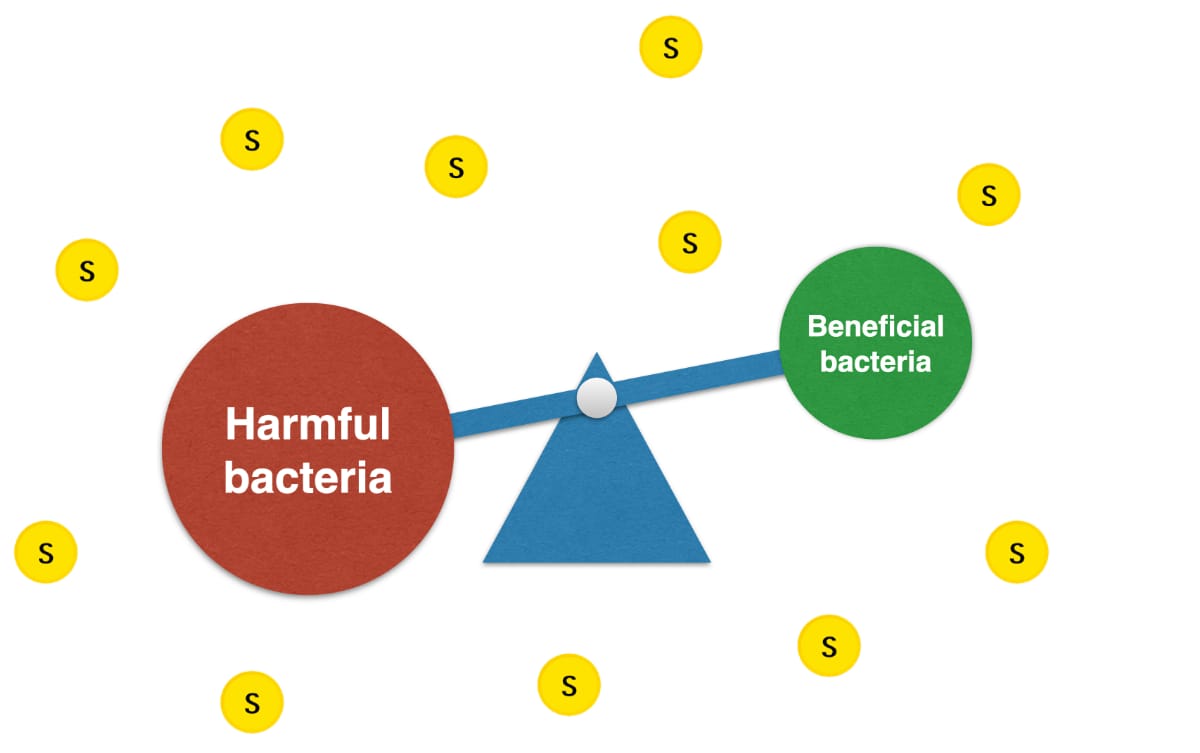Are sulfites dangerous for people suffering from food sensitivities?
01/15/2018 Food Intolerances
Sulfites are used as preservatives, because they inhibit the discoloring and the spoilage of foods very effectively. They are generally regarded as safe, however, in isolated cases they may cause severe adverse reactions and several fatal incidents have been reported so far. There is a lot of confusion about potential health effects, therefore, we put together the latest information about sulfites.
Adverse reactions from sulfites have been primarily studied in animal studies. High doses of sulfites have a neurotoxic effect on rats, they damage the reproductive organs, bone tissue, kidney and internal organs. The results from animal studies cannot always be transferred from one species to another, but they point to a potential hazardous effect.

Asthma patients are considered to be a risk group: in a subgroup of sensitive asthmatics sulfites can trigger asthmatic attacks. Current estimations suggest that 5 to 11 % of the asthmatic population could be affected. Asthmatics relying on the intake of steroids are the most vulnerable group, the intake of sulfites poses a high risk of acute asthma attacks.
For people with mast cell activation disorder sulfites may be problematic, too. The interaction of alcohol and sulfites seems to be particularly harmful as it can activate mast cells and trigger the release of histamine. This circumstance is a possible explanation why so many affected individuals tolerate alcoholic beverages very poorly.
Sulfites are almost exclusively found in preserved foods. They are usually added by the food industry to prevent decomposition. Foods containing more than 10 ppm of sulfites must be labelled – the relevant E-numbers are E 220–E 228. Sulfites may also formed naturally. They are a side product of the fermentation process and can be found in wine or vinegar. In our Food Intolerances app foods that contain sulfites can be easily highlighted (see figure).
 ▲ Sulfite containing foods can be highlighted in the Food Intolerances app.
▲ Sulfite containing foods can be highlighted in the Food Intolerances app.
To date, there are hardly any studies about the impact of sulfites on the human microbiome. When they were admitted in the 1960s the main focus was on the inhibiting effect on spoilage bacteria. Only in recent years it became obvious that sulfites also inhibit the growth of beneficial bacteria, e.g. lactic acid bacteria. The human digestive tract harbors a community of more than 800 microorganisms and next to nothing is known how the majority of these microorganisms react to sulfite exposure. Vital germs might be decimated by their antibiotic properties, resulting in a destabilized microbiome.
Clostridium difficile, also known as hospital germ, has the ability to resist the antibiotic effect of sulfites. It naturally occurs in the intestine and usually does not pose any threat to a healthy person. However, when its number increases alarmingly it becomes hazardous, as it can cause dangerous diarrhoeal diseases. The use of antibiotics can cause the intestinal overgrowth with C. difficile, because other bacteria, that act as its natural opponents, are diminished by the treatment. The effect of preservatives is by far less intrusive, but the constant intake of sulfites may shift the intestinal balance into a pathogenic direction in the long run (see figures 1 & 2).

▲ Figure 1: Intestinal microbiome in healthy balance.

▲ Figure 2: Detrimental impact of sulfites on the balance of the intestinal microbiome.
Additionally, sulfites may liberate certain toxins in the intestine. As soon as the intestinal bacteria come into contact with the toxic compound, they fall into a state of panic and release toxic and allergenic compounds when they die. These may cause harmful side effects in sensitive individuals.
Summarising the above, one can say that most people won't experience any direct effects following the ingestion of foods that contain sulfites. However, they can be extremely dangerous for a small subgroup of individuals. The continuous exposure to preservatives may have a negative long-term effect on the composition of the intestinal microflora. Therefore, especially people with an already impaired intestinal flora should minimize the intake of sulfites.
Back to blog
References:
L. Afrin et al., Mast Cell Activation Disease and Microbiotic Interactions, Clinical Therapeutics 37 (2015), 941–953
S. Irwin et al., Sulfites inhibit the growth of four species of beneficial gut bacteria at concentrations regarded as safe for food, Plos one Vol. 12(10), 2017, 1–14
A. Hardisson et al., Content of sulphite in frozen prawns and shrimps, Food Control 13 (2002) 275-279
I. Skypala, Adverse Food Reactions – An Emerging Issue for Adults, Journal of the American Dietetic Association 111 (2011), 1877-1891
H.-J- Suh et al., Preliminary data on sulphite intake from the Korean diet, Journal of Food Composition and Analysis 20 (2007) 212-219
Image:
Photo by Denis Sousa on Unsplash
Adverse reactions from sulfites have been primarily studied in animal studies. High doses of sulfites have a neurotoxic effect on rats, they damage the reproductive organs, bone tissue, kidney and internal organs. The results from animal studies cannot always be transferred from one species to another, but they point to a potential hazardous effect.

Asthmatics have a high risk for side-effects
Asthma patients are considered to be a risk group: in a subgroup of sensitive asthmatics sulfites can trigger asthmatic attacks. Current estimations suggest that 5 to 11 % of the asthmatic population could be affected. Asthmatics relying on the intake of steroids are the most vulnerable group, the intake of sulfites poses a high risk of acute asthma attacks.
For people with mast cell activation disorder sulfites may be problematic, too. The interaction of alcohol and sulfites seems to be particularly harmful as it can activate mast cells and trigger the release of histamine. This circumstance is a possible explanation why so many affected individuals tolerate alcoholic beverages very poorly.
Which foods contain sulfites?
Sulfites are almost exclusively found in preserved foods. They are usually added by the food industry to prevent decomposition. Foods containing more than 10 ppm of sulfites must be labelled – the relevant E-numbers are E 220–E 228. Sulfites may also formed naturally. They are a side product of the fermentation process and can be found in wine or vinegar. In our Food Intolerances app foods that contain sulfites can be easily highlighted (see figure).

Sulfites have a detrimental impact on the intestinal microflora
To date, there are hardly any studies about the impact of sulfites on the human microbiome. When they were admitted in the 1960s the main focus was on the inhibiting effect on spoilage bacteria. Only in recent years it became obvious that sulfites also inhibit the growth of beneficial bacteria, e.g. lactic acid bacteria. The human digestive tract harbors a community of more than 800 microorganisms and next to nothing is known how the majority of these microorganisms react to sulfite exposure. Vital germs might be decimated by their antibiotic properties, resulting in a destabilized microbiome.
Clostridium difficile, also known as hospital germ, has the ability to resist the antibiotic effect of sulfites. It naturally occurs in the intestine and usually does not pose any threat to a healthy person. However, when its number increases alarmingly it becomes hazardous, as it can cause dangerous diarrhoeal diseases. The use of antibiotics can cause the intestinal overgrowth with C. difficile, because other bacteria, that act as its natural opponents, are diminished by the treatment. The effect of preservatives is by far less intrusive, but the constant intake of sulfites may shift the intestinal balance into a pathogenic direction in the long run (see figures 1 & 2).

▲ Figure 1: Intestinal microbiome in healthy balance.

▲ Figure 2: Detrimental impact of sulfites on the balance of the intestinal microbiome.
Additionally, sulfites may liberate certain toxins in the intestine. As soon as the intestinal bacteria come into contact with the toxic compound, they fall into a state of panic and release toxic and allergenic compounds when they die. These may cause harmful side effects in sensitive individuals.
Summary
Summarising the above, one can say that most people won't experience any direct effects following the ingestion of foods that contain sulfites. However, they can be extremely dangerous for a small subgroup of individuals. The continuous exposure to preservatives may have a negative long-term effect on the composition of the intestinal microflora. Therefore, especially people with an already impaired intestinal flora should minimize the intake of sulfites.
Why do we care so much about this topic?
 We have been developing our price-winning "Food Intolerances" app since 2011 and we are happy to share our knowledge with you. Check it out:
We have been developing our price-winning "Food Intolerances" app since 2011 and we are happy to share our knowledge with you. Check it out:
Share article
Share article
Back to blog
References:
L. Afrin et al., Mast Cell Activation Disease and Microbiotic Interactions, Clinical Therapeutics 37 (2015), 941–953
S. Irwin et al., Sulfites inhibit the growth of four species of beneficial gut bacteria at concentrations regarded as safe for food, Plos one Vol. 12(10), 2017, 1–14
A. Hardisson et al., Content of sulphite in frozen prawns and shrimps, Food Control 13 (2002) 275-279
I. Skypala, Adverse Food Reactions – An Emerging Issue for Adults, Journal of the American Dietetic Association 111 (2011), 1877-1891
H.-J- Suh et al., Preliminary data on sulphite intake from the Korean diet, Journal of Food Composition and Analysis 20 (2007) 212-219
Image:
Photo by Denis Sousa on Unsplash
![[Blog]](../../rw_common/images/baliza_logo_retina.png)

